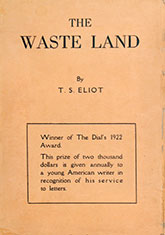The Waste Land
Critique • Quotes
 First edition
First editionFirst publication
1922
Literary form
Poem
Writing language
English
Author's country
England
Length
Five parts, approx. 2,700 words
Dry thoughts in any season
Eliot's masterwork? The poetic masterpiece of the twentieth century? Here's the problem I have with that: I don't like reading The Waste Land.
It's hard. Lines in foreign languages. References to classical literature. Quotations from ancient prayers. Academic-style footnotes by the author. And dreary. My lord, it's dreary. Eliot is one depressed and depressing poet.
Should difficulty rule out a work of literature from being considered great? No, but difficulty is something that has to be overcome by readers. The question is whether the work is great enough to make worthwhile the effort to overcome the difficulty. We have to ask whether it's so good that it's important to humanity despite most humans finding it inaccessible and thus getting little from it?
And my answer to this is no, it's not that good.
It starts well with those famous lines about spring. Eliot gives an ominous twist to what is usually considered a time of rejuvenation but it's something we can feel and understand. And then he goes on in sunlight a little with vignettes from delightful vacations.
Death in life
Immediately, though, the next stanza is referring to "this stony rubbish", "heaps of broken images", "dead trees" and "dry stones". This first section of the poem is titled "Burial of the Dead", after all. From here on, he's mixing the trivial enjoyments of life and the dark imagery of death and decay. The latter becomes dominant and yields in the end only to religious contemplation.
For many critics this is profound. To continually find death in life, to uncover beneath the superficial trappings of civilization a vast welling of unfulfillment, requires the talent of a deep artist, they seem to think. The references to old art, anthropology and religion don't hurt either—he's not just a depressive who can't find satisfaction in this current world but is connecting with the eternal tragedy of the human condition in a material universe.
Pshaw. There are plenty of tragedies to despair of in life, but also plenty of wonderful things, far more wonderful things than can be found in any religious meditation or hopes for a world beyond this one.
"Wait a minute," you say. "You're criticizing the poem for its content, for what the poet is trying to say, rather than how he says it."
That's right. Eliot himself makes it clear in this poem and elsewhere in his writing he feels a duty to put across a definite point of view, to elevate humanity with his insights. So why not attack him on the grounds he himself establishes?
Silly popular culture
Technically, there is indeed much to admire in this poem. As in "The Love Song of J. Alfred Prufrock", he deftly interweaves the high and the low—in some respects his experiment here is even more successful.
It's not all high seriousness. Eliot quotes not just from great art but from popular culture, even children's nursery rhymes and silly sound effects. At times he takes the fragmented approach to the edge of post-modernist incoherence (some would say over the edge). At times the collapsing colloquial passages are quite humorous. All in all it's an act of poetic acrobatics that for moments captures the confusion of the modern "wasteland".
But he always brings it back to his ponderous breast-beating over how insubstantial it all is. Death, death, death, everywhere. And in The Waste Land he starts in with the rats and ruins that come to shove out his more playful imagery. The arid plains. The dry bones. The parched rocks.
However many times I force myself to read this "modern masterpiece", I am unmoved. Such dreary sentiments are a poor advertisement for the man's religious outlook. Do we have to hate life so in order to hope for a better one?
— Eric
Critique • Quotes

